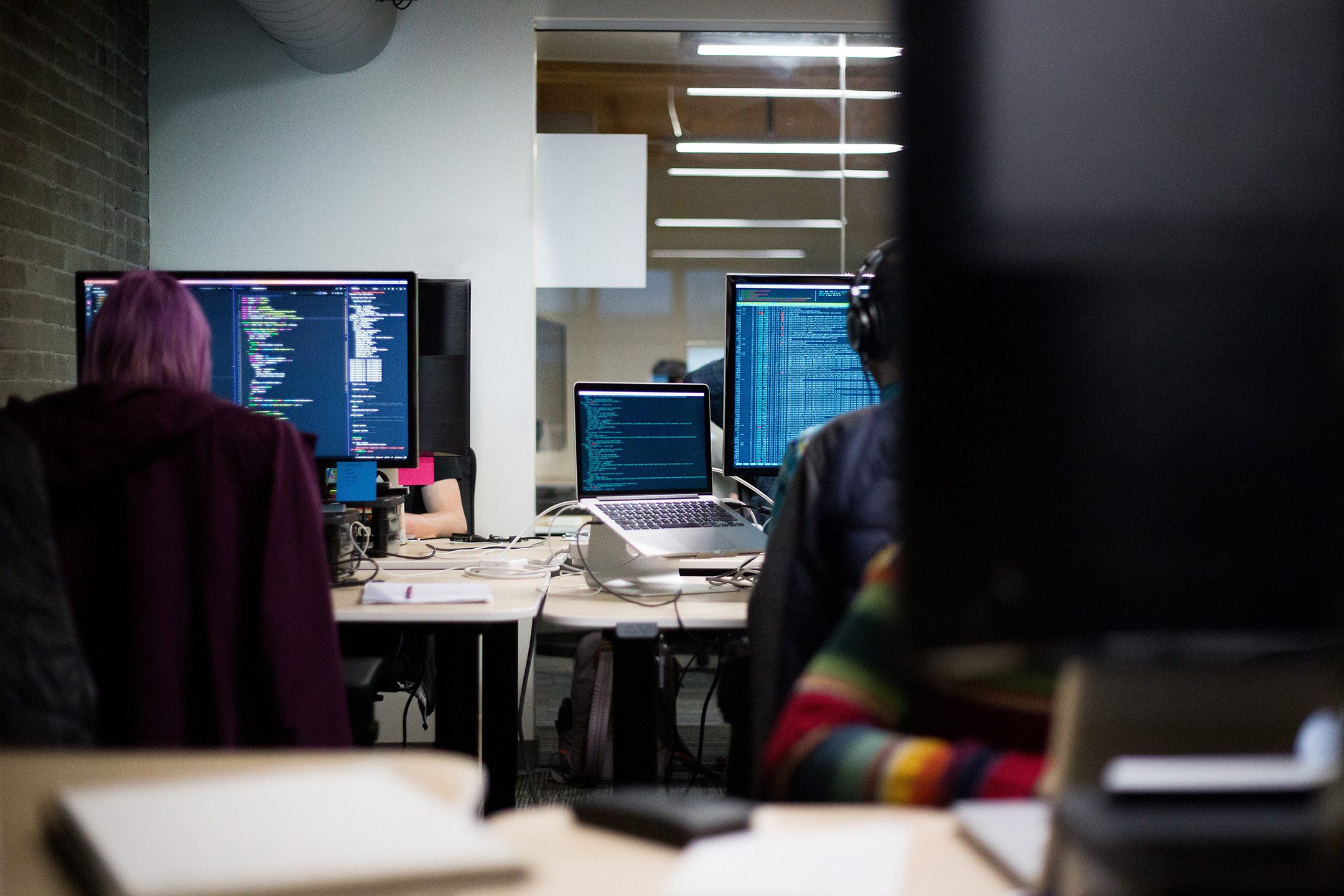We’re about to find out in Seattle. If you told any Seattleite on the street that our city has the most software job openings in the country, you’d likely get an eye roll and a snarky reply along the lines of, “Well duh! Have you seen South Lake Union lately?”
It still feels nice to see the proof in print: this week, Glassdoor announced that Seattle surpassed Silicon Valley in total share of software job postings. That also puts us in the lead for software jobs in the U.S.:
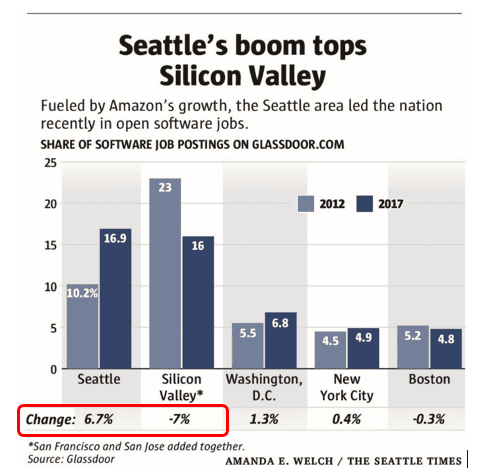
Beyond boosting the growth of tech giants like Amazon, Google, and Facebook, Seattle’s continued boom of tech talent will have long-term implications for the Seattle multifamily market, too. This wave of techies will change not only the city’s economic future, but its very geography, too.
What does it mean for the future of Seattle?
Incomes Will Keep Rising
The volume of software job postings in the graph above exemplifies intense market demand, and software developers are in short supply. That means median income for tech roles will continue rising as competition rapidly increases for talent in Seattle. Two hiring managers who are vying for the same Software Developer will continue to raise their counter offers, and the developer will walk away from negotiations with a much higher starting salary – resulting in higher baseline salaries next time a role is posted.
This process is evident in the chart below:
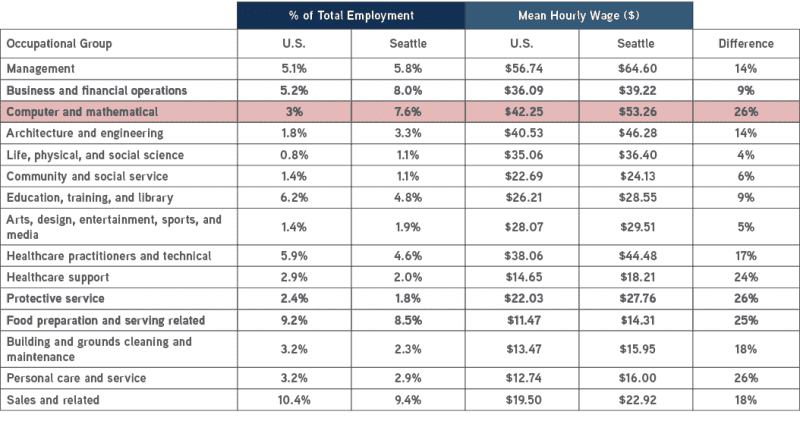
Not only does Seattle have more than double the concentration of Computer and Mathematical jobs, but these roles also pay 26% more than the national average. No wonder people keep moving here! Across the board, wages are higher in Seattle. And it’s worth noting that the multiplier effect is pushing all wages as well.
As STEM wages increase and outpace national averages, so goes wages for secondary, support industries, e.g., Food Preparation (+25%) and Personal Care & Services (+26%). Wage inflation for high earners is putting more money in all Seattleites’ pockets.
Seattle’s Population Will Keep Growing
Our modern-day tech gold rush keeps peaking, again and again. Just when critics and investors expect the bubble to burst, Seattle companies keep hiring. Yet Seattle’s tech boom is really a story of tech migration.
While Microsoft attracted plenty of tech gurus to the area in the 1990s and early 2000s, our current market cycle is on another level. Demand for software development and cloud-based skills is simply too high for local talent to satisfy.
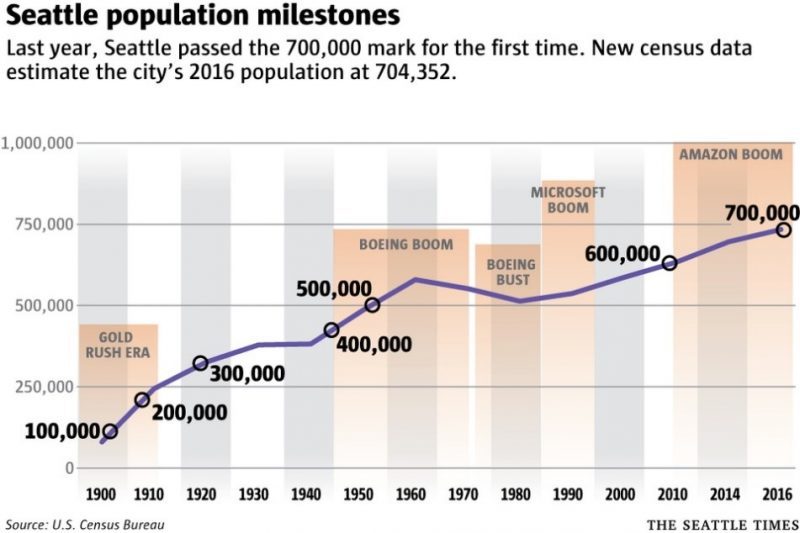
When I read about “most software job postings,” in the country, what I really see is a hand-delivered invitation for every software developer in the country to pack their bags. Seattle is still the fastest-growing city in the nation, and we show no signs of slowing.
There’s more room for rent growth in Seattle’s urban core
All these new techies need a place to live in Seattle, and most of them are looking to rent. Rent growth in the 50+ newer product has steadied over the past year as the market absorbs an influx of new developments, but that doesn’t mean these properties can’t push rents in this cycle. The high-wage tech talent moving to Seattle wants to live close in to the urban core where they are close to work and play, and they’re willing and able to pay for that luxury.
The sheer volume of wealthier renters moving into the market has allowed newer 20-50 unit buildings to reap the benefits, too. Rents increased cumulative by 37% for 20-50 unit buildings since 2010. Vacancy has remained sub-3% for most of this growth, and the recent upward trends in vacancy (due to new supply) is surprisingly trending downward again.
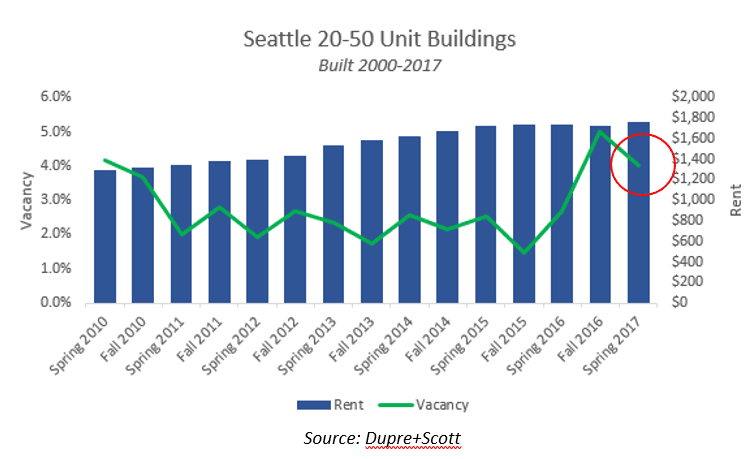
Seattle’s first ring and second markets continue to experience impressive rent growth
Close-in suburban markets like Northgate, Shoreline, and Renton have experienced strong rent growth as Seattleites who can no longer afford the city seek cheaper rent further out. A lot of this rent growth can be traced along the future light rail route, but areas like Bothell, Federal Way, and Juanita have also experienced rising rental rates.
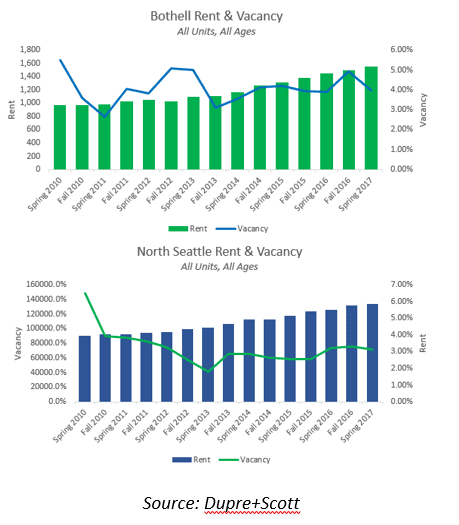
Will the Tech Bubble Burst?
With any period of rapid economic success, there are doubters and there are pessimists. As Seattle’s star keeps rising, many wonder: will the good times last?
My answer is yes, but with caveats. I don’t think Seattle will continue to welcome thousands of new residents weekly, but the city will keep growing. I don’t think Amazon will grow so big that it begins to run the city, however I think it will keep hiring smart, talented people who will filter into the rest of Seattle’s economy – our tech ecosystem will achieve the preeminence of Silicon Valley sooner than others thought. The multifamily market always has a ceiling each cycle, yet there are still fantastic opportunities to invest and reap the benefits of Seattle’s current tech gold rush.
As always, call us if you have questions about the Seattle market – we work hard to stay on top of the latest trends and developments in Seattle, let us Turn our Expertise into Your Profit!

